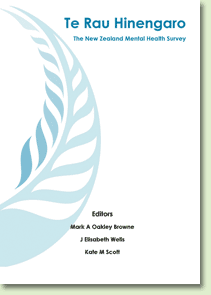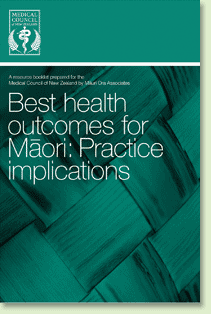In this article 
View / Download pdf
version of this article
Improving Māori mental health is a government health priority. This commitment can be achieved through tangible
and culturally appropriate mental health services.1
Cultural Identity
Good mental health depends on many factors and among indigenous populations, cultural identity is considered critical.
Being Māori is recognised as the basis for recovery for tāngata whaiora (Māori mental health service users)
and lies firmly within the context of ones identity as Māori. The rediscovery of whakapapa – the connections that
make us who we are and where we come from - is the foundation of recovery.2
One of the challenges for early intervention is the ability to define what actually constitutes a problem - what should
health professionals be worried about and what is normal for the patient and whānau. Understanding cultural differences
in the presentation of symptoms is important.3
| Kaupapa Māori Mental Health Services |
Given the high prevalence of mental health issues in Māori and the fact that general practice
is the leading source of service contact, GPs need to consider establishing links with Māori consumers, Māori
providers and Māori mental health teams. Consideration needs to be given as to how shared care with Māori
providers might work.3
Kaupapa Māori community health workers are willing to share their knowledge and skills with mainstream services,
in order to develop intersectoral relationships and a team approach to improve outcomes for whānau.
While there is no set criteria, Kaupapa Māori mental health services offer a range of treatment and support
services that typically include:5
- Whanaungatanga (kinship, family relationships)
- Whakapapa (genealogy)
- Cultural assessment
- Empowerment of tāngata whaiora and their whānau
- Te Reo Māori (Māori language)
- Tikanga Māori (customs and culture)
- Kaumātua guidance
- Access to traditional healing
- Access to mainstream health services
- Quality performance measures relevant to Māori
Kaupapa Māori mental health services can be accessed through DHB mental health services. There are also a number
of contracted Kaupapa Māori mental health non-government organisations operating in some communities. |
Considerations may include:
- Is this just them?
- Is this how they normally are?
- Is something else wrong?
Cultural assessment
Cultural assessment is the process through which the relevance of culture to mental health is determined.4 It
is widely accepted as a key element of mainstream mental health service delivery and responsiveness to Māori. It
supports providers to develop and maintain culturally effective and relevant services to tāngata whaiora and whānau.1
Cultural assessment should only be carried out by those trained to do so
Guidelines published by the Mental Health Commission in 2001 emphasise that cultural assessment is complementary to
clinical assessment and should only be carried out by those trained to do so. Expertise in Tikanga (customs), Te Reo (language)
and Matauranga (knowledge) Māori are fundamental prerequisites.1
The assessment is used to determine the mental state of tāngata whaiora. It can also be used to determine the significance
of cultural factors and to plan treatment and rehabilitation processes to address these. Cultural assessment is only useful
if it leads to a comprehensive recovery plan that includes appropriate cultural support throughout the whole clinical
care pathway.1
Cultural assessment may take different forms and is an integral part of all points of care.
Cultural disparities in mental health care
Successful mental health management in primary care relies on the GP's ability to recognise and appropriately respond
to mental health problems. However some research suggests that there may be disparities in provision of care. For example,
a study of one South Auckland general practice published in 2002, found that while Māori were no more likely to be
depressed, they were significantly less likely to be treated with antidepressants than non-Māori. However the study
was not able to identify the reason for this difference, whether it was a disparity in care or an issue of patients not
wanting to take medication.6
Some New Zealand health professionals hold unfounded beliefs that Māori are genetically more prone to psychosis
and other serious mental illnesses.7, 8
Mate Māori and other specific Māori Concepts relating to Mental
Health9,10
Some mental and behavioural states cannot be accommodated in Western classifications and Māori explanations for
poor health can be quite different from Western beliefs.
Mate Māori, for example, is related to spiritual causes, and requires the intervention of a tohunga or priest.
The term refers essentially to a cause of ill health or uncharacteristic behaviour which stems from an infringement of
tapu (a tribal law) or the infliction of an indirect punishment by an outsider (a mākutu). It may take several forms,
physical and mental, and various illnesses, not necessarily atypical in presentation, may be ascribed to it.
| While it is useful for health professionals to have some idea that mate Māori and other specific
conditions exist and to have heard the terms, it is very important that they do not assume that they understand or have
any expertise in them. This is the area of expertise of tohunga and kaumātua assisted by Māori cultural workers.
It is vital to seek expert cultural assistance if these concepts arise when working with Māori.10 |
Mate Māori applies to physical as well as mental illnesses and has increasingly become a focus to explain emotional,
behavioural and psychiatric disorders. Māori may be reluctant to discuss mate Māori fearing ridicule or pressure
to choose between psychiatric and Māori approaches. However, one approach need not exclude the other as cooperation
between traditional Māori healers and health professionals is now becoming acceptable to both groups.
Mate Māori does not mean there cannot be a mental disorder. Rather, it may be used to explain the cause of the
illness rather than the symptoms. Mate Māori remains a serious concept within modern Māori society, and may
be more convincing to Māori than complex clinical explanations.
Other behaviours may also present as if they were mental disorders, for example:
- Whakamā - a mental and behavioural response that arises when there is a sense of disadvantage or loss of standing
and can manifest as marked slowness of movement and lack of responsiveness to questioning, as well as avoidance of any
engagement with the questioner. A pained, worried look can add to a picture that is suggestive of depression or even
a catatonic state. But the history is different and the onset is usually rapid - unlike other conditions where a more
gradual development occurs.
- Sometimes, because Māori will often report seeing deceased relatives or hearing them speak, a diagnosis of schizophrenia
or some other psychosis may be made. However, visions or hearing voices in the absence of other mental health symptoms
are not a firm basis for diagnosing a serious mental disorder in Māori.
Some New Zealand health professionals hold unfounded beliefs that Māori are genetically more prone
to psychosis and other serious mental illnesses.

The New Zealand Mental Health Survey 2003/4, Te Rau Hinengaro11
- Just over half of Māori have experienced a mental disorder during their lifetime, and just under a third within
the past 12 months.
- The most common lifetime disorders for Māori were anxiety (31.3%), substance disorder (26.5%) and mood disorders
(24.3%).
- Mental disorders for Māori were common in those aged 16 to 44 years, those living in low income households and
those living in areas of high deprivation. There were no differences in rates by region or rurality.
- Contact with health services for mental health needs was low for Māori relative to need. Only half of those
with a serious disorder in the previous 12 months had any contact with mental health services (compared with two-thirds
of non- Māori).
- General practice was the leading source of service contact.
CASE STUDY FROM BEST HEALTH OUTCOMES FOR MĀORI: PRACTICE IMPLICATIONS12
“Smoking can be bad for your health”

Recognition of complementary world views
A 62 year old Māori man who works in a bank, visited his Pākehā GP because he didn't feel well and was
short of breath. As the consultation progressed, the doctor felt that it was not going too well, so he shared these thoughts
with the patient and asked if there was something else bothering him. The patient sighed and said yes. He said, "I know
what's wrong, doc. I know why I'm crook. I took tobacco to the urupā (cemetery) and then had a smoke." The GP told
the Māori patient that he didn't know what the significance of that was and asked if he could explain. The patient
revealed that the urupā is tapu (sacred), while cigarettes are noa (common), so he had committed a serious breach.
The doctor asked the patient if he knew what he had to do about that. The Māori patient heaved another sigh and
explained that he had to see a priest.
Without deriding the patient's belief system ("No, you've got heart failure caused by hypertension and atherosclerosis."),
the doctor acknowledged that while the patient sought assistance for the violation of tapu within the Māori culture,
he could prescribe medicines to help with the breathlessness.
The patient's firmly held belief as to why he is unwell ("disease attribution") is rooted in his cultural world view:
he's unwell because he's breached tapu by taking tobacco into the urupā and then smoking it. It is generally non-productive
to argue disease attribution with a patient, as it is usually perceived as a sign of disrespect to their belief system.
By contrast, if you can show respect for their beliefs while simultaneously offering complementary assistance from
the world of Western, orthodox medicine, your suggestions are much more likely to be adopted. In this case, the GP was
comfortable with his patient maintaining his disease attribution and following the correct protocol for dealing with
that breach of tapu, but he simultaneously offered supportive treatment for the breathlessness associated with heart
failure. The patient was comfortable with the idea of seeking help from both Māori and Western cultures, and accepted
the GP's prescribed treatment.
References
- Mental Health Commission. Cultural Assessment Processes for Māori. Guidance for Mainstream Mental Health Services.
Available from http://www.mhc.govt.nz Accessed May 2008.
- Mental Health Commission. Te Haererenga mo te Whakaōranga 1996-2006. Wellington; 2007.
- Holdaway, M. Mental Health in Primary Care. A report for Te Rau Matatini, Palmerston North, New Zealand. 2003. Available
from http://www.matatini.co.nz/ Accessed May 2008.
- Durie M, Gillies A, et al. Guidelines for purchasing personal mental health services for Māori. A report prepared
for the Ministry of Health, Research Report TPH 95/4, June 1995.
- Mental Health Commission. Blueprint for mental health services in New Zealand. 1998. Available from
http://www.mhc.govt.nz Accessed
May 2008.
- Arroll B, Goodyear-Smith F, Lloyd T. Depression in patients in an Auckland general practice. NZ Med J 2002:115(1152):176-9.
- Johnstone K, Read J. Psychiatrists' recommendations for improving bicultural training and Māori mental health
services: a New Zealand survey. Aust N Z J Psychiatry 2000;34:135-45.
- McCreanor T, Nairn R. Tauiwi general practitioners talk about Māori health: interpretative repertoires. NZ Med
J 2002;115(1167):U272.
- Durie, M. Mauri Ora: The Disparities of Māori Health. New Zealand: Oxford University Press; 2001.
- Te Iho, Māori mental health training programme. Available from http://www.teiho.org Accessed
May 2008.
- Robson B, Harris R (Eds). Hauora: Māori Standards of Health IV. A study of the years 2000 – 2005. Wellington.
Te Rōpū Rangahau Hauora a Eru Pōmare. 2007.
- Medical Council of New Zealand. Best Health Outcomes for Māori: Practice Implications. Available from
http://www.mcnz.org.nz Accessed
May 2008.